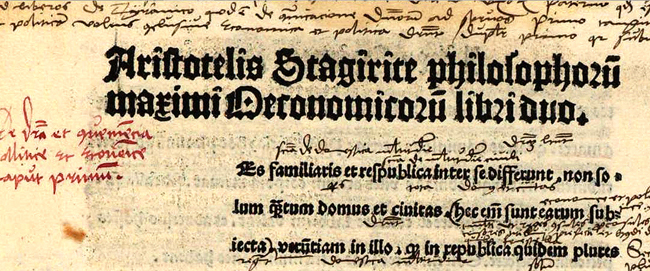
The connection between economic issues on the one hand and, on the other hand, questions regarding forms of governance and collectivity and discussions concerning the spatial structure and arrangement of the house, just about covers – apart from the legal and political dimension of the oikos – the list of subjects treated of in ancient oikonomia literature.
| 14 | Researchers |
| 9 | Research Projects |
| 2 | Dissertation Projects |
| 46 | Publications |
| 11 | Events |
| 16+ | Cooperating partners |
The oikos was one of the ancient world’s most important places of knowledge and activity, a space where questions of reproduction, habitation, household economy, management and authority were addressed. This research group investigated diverse places, forms of knowledge, concepts, things, practices, techniques and economic crises in antiquity, as well as specific transformations that ancient oikonomia and chremastics underwent in the middle ages, the early modern era and in modern times. The group’s research focused on two hypotheses:
The first was based on the assumption that the history of ancient economic transformations opens a convenient door to an understanding European culture(s) from the early stages to the present. This implies a certain distancing from traditional approaches, which attribute the modern dominance of economics to the Protestant work ethic, the “scientification” of the economy, the discovery of homo economicus and the modern money and credit system. The group’s research focused much more on the ancient oikos, in order to explore ways in which the house and household regimen is reorganized in the course of political, religious and literary appropriations and reformations.
The second hypothesis – which was connected with research into regulative instruments, preservation-based interests and capital formations, in which household calculations come to influence theological, economic and cultural arrangements beyond the oikos – stated that the modern economy owes its central position to just such non-domestic, i.e. non-economic, adaptations, and derives its symbolic credit from this very source.
Research Projects
- (B-3-1) Economic theology / theological economy
- (B-3-2) Oikonomia Rossica: genealogy and poetology of economical thought in Russia
- (B-3-3) The Soul as Economic Space
- (B-3-4) Parasitic Economies
- (B-3-5) Aristoteles' Oikonomika
- (B-3-6) Poetological Household Management
- (B-3-7) Economic and social reproduction. The transformations of “Chrematistics”
- (B-3-8) Oikonomia and Agora
- (B-3-9) Aristotelian economics. Epistemic and normative aspects of Aristotle’s theory of the household and the πόλις
